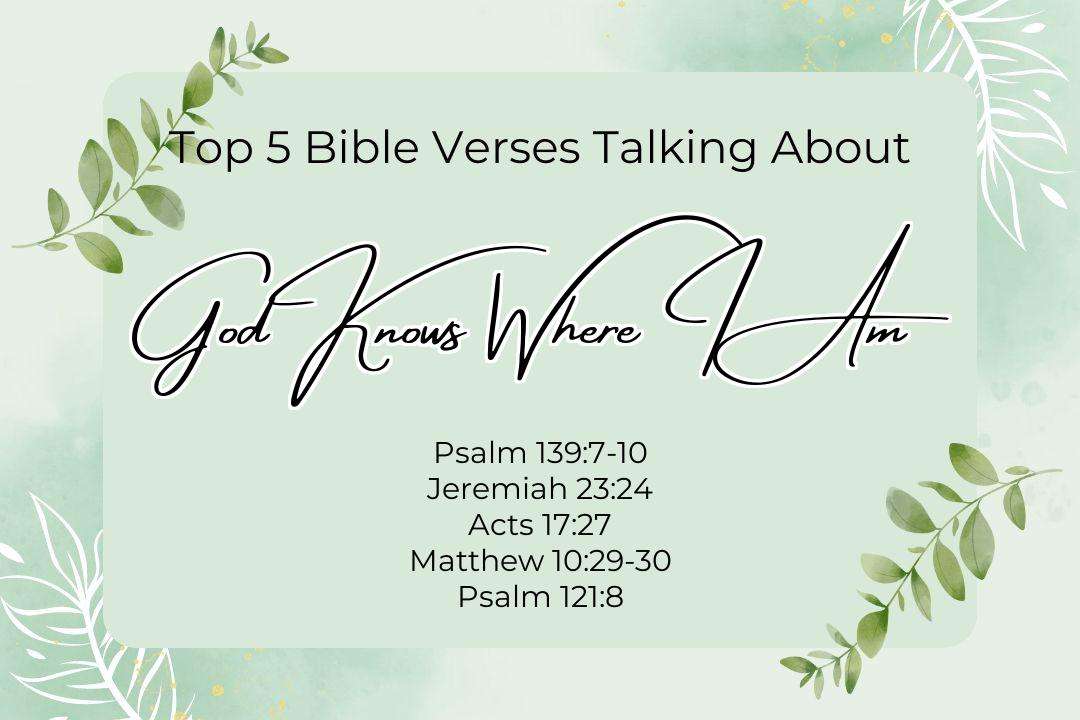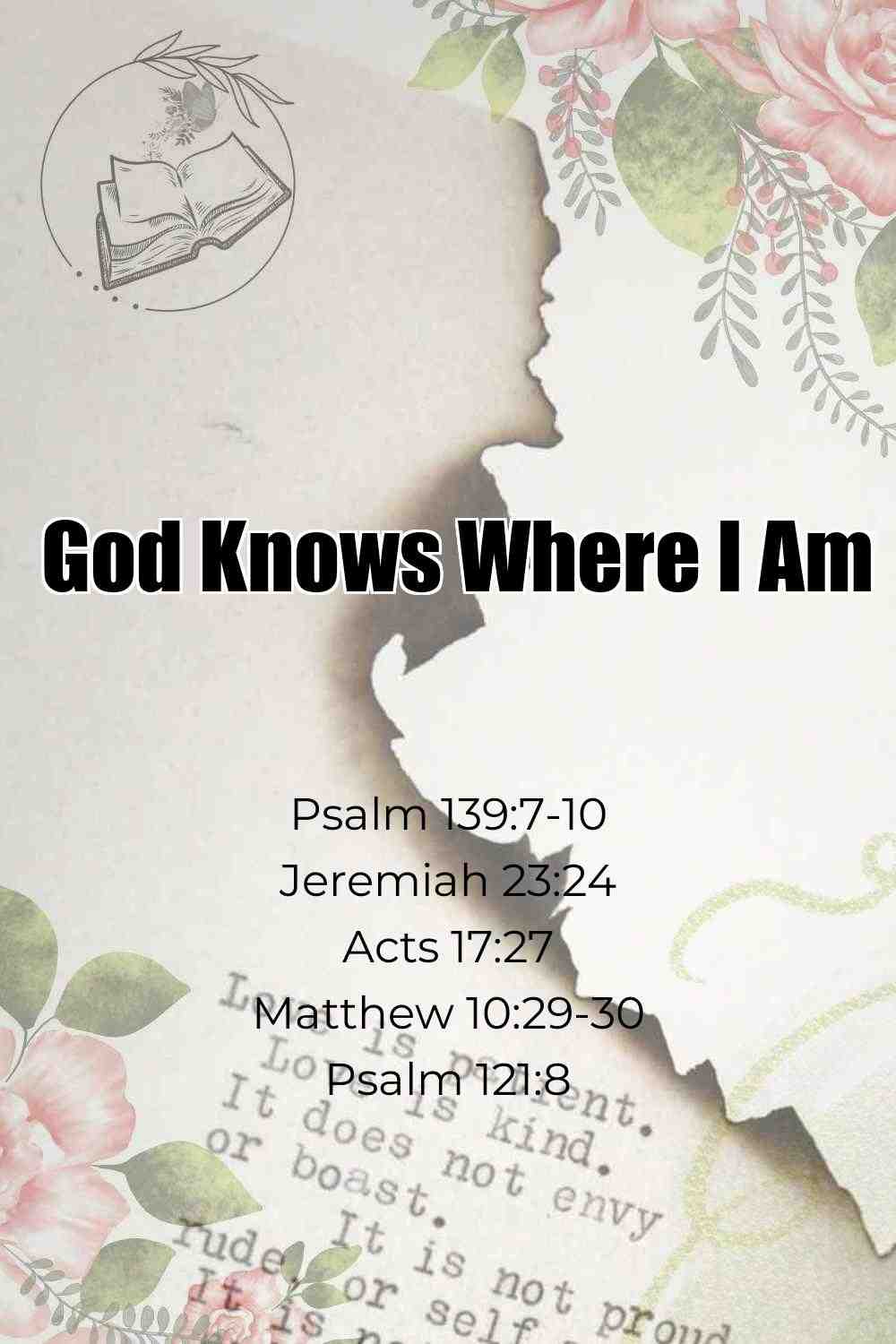Honestly, I’ve had days where it felt like I was wandering round in circles, no direction, no clue who to turn to – it’s like, am I the only one who’s going crazy here?
I mean, I’ve come to realize that God’s got my location pinned down – and I don’t just mean my physical address, He’s got the GPS on my emotions and spiritual state too. It’s kinda mind-blowing to think about, but He’s got the inside scoop on all my thoughts, all the stuff I’m scared of, and all the things I’m hoping for.
But let’s get real for a sec – what does it even mean that God’s all-knowing, and how’s that supposed to help me navigate the ups and downs of life?
Top 5 Bible Verses About God Knows Where I Am
I came across these Bible passages and, honestly, they’ve given me a lot to think about. The thing is, they somehow manage to shine a different light on what we’re trying to figure out here – for me, at least, they’ve been super helpful in gaining new insights. I reckon they’ll help you find a fresh perspective, too.

Picture by BibleBreathe.com about God Knows Where I Am
Figuring Out God’s Omniscience
What God’s Omniscience Is
To this day I recall when I first came across the phrase “God knows where I am.” At the time, life had been pretty tough and a friend pointed out that regardless of where I’d ended up, God always knew what was going on.
I started digging into the whole idea of God’s omniscience and what I uncovered was way more profound than just some words of encouragement – God’s omniscience is this all-encompassing understanding He has of everything that’s ever happened, is happening now, and will happen.
What the Bible Says About God Knowing Our Thoughts and Actions
The Bible has this to say,
“O Lord, thou hast searched me, and known me. Thou knowest my downsitting and mine uprising, thou understandest my thought afar off.” (Psalm 139:1-2, KJV).
Those lines have stuck with me – they’re a reminder that God’s got the lowdown on every little detail of my life, right down to my deepest fears and desires… it’s a weird feeling, having someone know me better than I do myself.
You’ve got another passage in the Bible that says,
“Neither is there any creature that is not manifest in his sight: but all things are naked and opened unto the eyes of him with whom we have to do.” (Hebrews 4:13, KJV).
Now that’s a real kicker – on one hand it’s kinda nice knowing God’s got my back, but it’s also pretty unnerving when you consider He sees me at my worst… even when I think nobody’s watching.
What God’s Omniscience Means for Us
Alright, so what does it all mean? Well, pretty much everything’s out in the open where God’s concerned. But on the flip side, He’s right there with us, even when we’re wandering blind – always looking out for us and showing us the way.
As that well-known theologian, A.W. Tozer, put it, “God is not a static thing, but a dynamic, pulsating, living Person who is always acting, always thinking, always loving.”
I mean, there’s definitely comfort in the idea of God knowing all – even when I got no clue what He’s got cooking. It’s a good feeling to know I ain’t alone in all this.
Next time you’re feeling like you’re wandering the desert, just remember – God’s always keeping track, He’s got your best interest at heart, and He’ll always walk you home.
The Nature of God’s Knowledge
How God knows everything
To be honest, I’ve had those moments where I’m like, “Does God even know what’s going on in my life?” You know, when you’re just trying to stay afloat in the midst of all the craziness. But then you got the Bible, which is pretty reassuring – it says God’s all-knowing, all-powerful, always present, and all that jazz.
The Bible puts it this way:
“For the ways of man are before the eyes of the Lord, and he pondereth all his goings.” (Proverbs 5:21, KJV).
It’s kinda mind-blowing, but this verse tells me God’s got eyes on everything – big life choices, tiny details, the whole nine yards. He knows where I shine and where I suck, what I’m hoping for, and what keeps me up at night. Heck, He even knows how many hairs are chillin’ on my head (Matthew 10:30, KJV).
The relationship between God’s sovereignty and human free will
Now, just ’cause God knows all doesn’t necessarily mean He’s controlling every move, right? Do we really get to choose what we do, or is it all just part of some predetermined master plan? It’s one of them questions that’s kept theologians and philosophers scratching their heads for ages. For me, I think the answer lies somewhere in between – God’s got His sovereignty thing going on, but He’s also given us the freedom to choose.
C.S. Lewis nailed it when he said, “God’s sovereignty is not a tyranny, but a loving guidance.” So yeah, God’s giving us some wiggle room, but He’s also steering us toward His ultimate plan.
The role of prayer in relation to God’s omniscience
Here’s another thing that’s popped into my head before: If God knows it all already, why bother praying, right? But the thing is, prayer’s not just about telling God what’s on your mind; it’s more about developing that relationship vibe.
Take what the Bible says:
“The effectual fervent prayer of a righteous man availeth much.” (James 5:16, KJV).
When I pray, it’s not just about running through my wish list – it’s more about getting my heart in sync with God’s plan. Prayer’s not about altering God’s mind but altering mine to be in line with what He wants. It’s like, the more I pray, the more I trust, even if I don’t fully get it. That’s pretty beautiful.
Finding Solace in God’s All-Knowing Nature

Photo modified by BibleBreathe.com. Original photo by Sonika Agarwal on Unsplash
The Comfort That Comes from Knowing God’s Got My Back
Sometimes I feel like I’m totally on my own – no direction, no one understanding what I’m going through. But, somehow I recall, God’s got eyes on me, wherever I am. My struggles, fears, and doubts? He knows ’em all.
When uncertainty’s got me in its grip, it feels like navigating a super-dense forest, with zero sense of which path to take. But what if I let you in on this: God’s basically got a tracker on us at all times? Our exact whereabouts are no secret to Him, and He’s guiding us, even if we can’t see our way.
The Bible tells us,
“O Lord, thou hast searched me, and known me.” (Psalm 139:1, KJV).
Honestly, every time I come across this verse, I get the shivers. It’s profound: God knows me like an open book. My emotions, thoughts, deepest longings – all are known to Him. And with all that intel, He’s always scheming for my good.
Resting in God’s Presence and Care
In times of feeling kinda lost, I keep myself focused by recalling that God’s not only with me, He’s heavily invested in my life – He’s no spectator, merely observing from the sidelines. No, He’s all in, always interacting, offering guidance, care and reassurance – it may not be super noticeable, but He’s working on my behalf nonstop.
Bible also reminds us,
“And the Lord, he it is that doth go before thee; he will be with thee, he will not fail thee, neither forsake thee: fear not, neither be dismayed.” (Deuteronomy 31:8, KJV).
This here verse gives me the motivation to step out, despite messy circumstances ahead. Knowing He precedes me and certainly won’t turn his back makes me far more more likely to follow.
Tales from Scripture – Stories of God being “on it”
Take it back to the olden days and flick through your Bible, you’re going to notice something stand out – it’s totally normal for God to rock up, wherever His people are struggling, and sort them out.
The Hagar narrative in Genesis also deeply touches me. Abused by Sarai, desperate and totally overlooked and helpless, she flees, yet, whom does she bump into? Only the ONE. There. Straight away! in that wilderness too.
Bible relates their encounter as such
“And she called the name of the Lord that spake unto her, Thou God seest me: for she said, Have I also here looked after him that seeth me?” (Genesis 16:13, KJV).
Yeh, those words give me the comfort, knowing Im recognised not discarded – no stray is unknown to this one true loving Father It stands solid – An encouragement! He holds us right before his compassionate sight. Working His unexplainable rescue and aid.
Implications of God’s Omniscience for Christian Living
The Importance of Living a Life of Integrity and Honesty
I’m still wrapping my head around the idea that, no matter how lost I get in life, God knows exactly where I am. It’s like, on one hand, having an all-knowing God is super comforting, but on the other, it means He sees all my ugly stuff too.
That Bible verse still gets to me –
“For there is nothing hid, which shall not be manifested; neither was any thing kept secret, but that it should come abroad.” (Mark 4:22, KJV).
For real, as a Christian, it’s like, I don’t have a choice: living authentic is the only way to be. So whenever I’m feeling the urge to twist the truth or put on a mask, God always calls my bluff.
How God’s Knowledge Should Influence Our Thoughts, Words, and Actions
Knowing God’s got His eye on me is hella motivating. It’s like, He’s got a front-row seat to all my thoughts, words, and actions. Then there’s this thing Paul wrote,
“For if our heart condemn us, God is greater than our heart, and knoweth all things.” (1 John 3:20, KJV).
That verse has taught me that, instead of feeling all guilt-trippy about it, God’s knowledge is actually meant to inspire transformation. My goal is to line up my life with His truth as I learn and grow.
The Role of Confession and Repentance in Relation to God’s Omniscience
Soo…what about when I mess up? Like, big time. Luckily, it turns out God’s omniscience isn’t there to condemn me – it’s more of an invitation to confession and repentance. So, when I acknowledge where I went wrong and swallow my pride, I can just ask for forgiveness.
I love that Psalm 139 bit,
“Search me, O God, and know my heart: try me, and know my anxieties; And see if there be any wicked way in me, and lead me in the way everlasting.” (Psalm 139:23-24, KJV).
For me, it means that God knowing everything isn’t about knowing all the crap I’m hiding, but about Him revealing the stuff in me that needs to change – and Him guiding me along the way. He knows where I am – good or bad – and He’s taking me somewhere better.
My Take on the Misconceptions About God’s Omniscience
Can God’s Knowledge Really Predetermine Our Decisions?
Honestly, understanding God’s all-knowing power has been kinda tough for me in the past. Like, the fact that He sees right through me – it’s comfortin, but also pretty intimidatin at the same time. One thing I used to get hung up on though, was this idea that God’s knowledge means He’s decidin all our choices for us.
It says in the Bible,
“The heart of man plans his way, but the Lord establishes his steps” (Proverbs 16:9, KJV).
I like this verse cause it reminds me, yeah, God might know what I’m gonna do, but He’s not the one doin it for me. I still make my own choices.
Think about it like a parent, they might think their kid’s gonna mess up or whatever, but just cause they think that doesn’t mean they’re the ones doin it for ’em. They still gotta let the kid learn, and same with God, He knows what’s comin, but that doesn’t predetermine it – He’s just gettin ready for what happens next.
Omniscience and Human Responsibility
There’s another thing I used to get mixed up about: thinkin God seein all and knowin all meant we were basically off the hook, ya know? No more being accountable for our own actions. That’s so not how it is.
It’s like they say, “more power, more responsibility”. So I figure, since God’s got that knowledge goin on, that just adds more weight to what we do. It’s still on us to make our own decisions and live with ’em.
That’s what C.S. Lewis said anyway, “God created things which had free will. That means creatures which can go either wrong or right.” Our free will’s pretty important – it makes what we decide mean more. And knowin all or not, God’s not here to get rid of our ability to make a choice.
God Knowin Everything Beyond Just the Present
One other thing I think people misread: they say God only sees the right now, the present. But from the Bible it’s clear – He’s way more than that – and His knowledge isn’t gonna hit any roadblocks or get jammed up just ’cause of time and all that.
As that Psalm writer said it,
“Thou compassest my path and my lying down, and art acquainted with all my ways. For there is not a word in my tongue, but, lo, O Lord, thou knowest it altogether” (Psalm 139:3-4, KJV).
That’s why I say God understands exactly what’s goin on – it’s cause He knows where I’ve come from, He knows the now, and what’s in the future. This gives me faith; especially since He’s walkin besides me in everything.
Biblical Examples of God’s Knowledge of Human Circumstances
Finding comfort in knowing God knows what’s going on with me, no matter how bad things seem, is what keeps me going, ya know?
God Sees Us in the Darkest Places
That bit in the Bible about Hagar’s journey into the desert really hits home for me – like, God knows exactly where I’m at, even if I’m feeling super alone.
After dealing with some pretty cruel treatment from Sarah, her mistress, Hagar took her kid Ishmael and booked it into the unknown.
And right in the midst of all that uncertainty, God reaches out and says,
“What ails thee, Hagar? fear not; for God hath heard the voice of the lad where he is.” (Genesis 21:17, KJV).
At that exact moment, Hagar’s got this newfound understanding: God sees her, hears her, and He’s right there with her, even on her worst days.
God Provides for Us in Times of Need
Think about the story of the Israelites stuck in the desert – another solid example of God knowing our circumstances inside and out.
So, they’re roaming the wilderness, and what does God do? He shows up, taking care of basically every need they’ve got: food, shelter, protection, the whole nine yards.
According to scripture,
“And the Lord went before them by day in a pillar of a cloud, to lead them the way; and by night in a pillar of fire, to give them light; to go by day and night.” (Exodus 13:21, KJV).
This always reminds me: even when life gets pretty hazy, and I’m all, “where do I go now?” – God’s there to guide me.
Jesus: The Ultimate Example of God’s Knowledge and Care
If you want to talk about someone who truly gets it, that’d be Jesus.
From day one, the day He was born, all the way up to the cross – Jesus had this crazy insight into what was going on around Him.
He didn’t just see what was on the surface – the pain people were hiding, the hurt they couldn’t talk about – He saw all of that, and He was like, “I’ve got this.”
Just like it’s written,
“For we have not an high priest which cannot be touched with the feeling of our infirmities; but was in all points tempted like as we are, yet without sin.” (Hebrews 4:15, KJV).
That right there – that tells me Jesus isn’t just aware of what I’m dealing with; He’s not gonna shy away from it. He’s got a way to make it through, and He’s all about helping me find my footing.
What Do You Think?
Have any thoughts on today’s scripture? Share them in the comments below. Let’s explore the message together!
Enjoyed this post? Share it with your friends on social media and help spread the word!

Photo modified by BibleBreathe.com. Original photo on Unsplash.
Frequently Asked Questions About God Knows Where I Am
What does the Bible say about God knowing my location?
To be honest, I’ve always found solace in them words from Psalm 139:7-10 – it’s like, God’s always got my back, He knows exactly where I’m at. It’s a pretty cool feeling knowing that, no matter where I end up, He’s aware of it.
How does God know my circumstances and struggles?
For me, it’s simple: God’s all-knowing, He’s everywhere, so of course He’s gonna know what’s going on with us. I mean, have you read that verse about Him being close to those with broken hearts? That tells me He’s not just aware of our struggles, He’s right there with us, trying to guide us through the tough times.
What Bible verses remind me that God is always with me?
Personally, I cling to verses like Joshua 1:9 and Matthew 28:20 – they’re like, my go-to reminders that God’s always got my back. He’s not gonna leave me hanging or anything, He’s gonna give me the strength I need, and that’s a pretty awesome feeling.
Matt Turner
I’m Matt, and I love breaking down Bible verses in a way that’s easy to understand and apply to everyday life. My goal is to help you connect with God’s Word and find practical ways to live it out. Whether you’re new to the Bible or just looking for some fresh insights, I’m here to walk with you and share what I’ve learned along the way.

